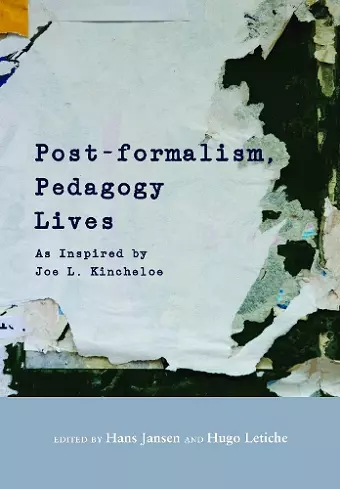Post-formalism, Pedagogy Lives
As Inspired by Joe L. Kincheloe
Hans Jansen editor Hugo Letiche editor
Format:Hardback
Publisher:Peter Lang Publishing Inc
Published:29th Dec '17
Currently unavailable, and unfortunately no date known when it will be back

Joe L. Kincheloe (1950–2008) was one of North America’s leading critical pedagogy scholars. He defined post-formalist thought in terms of deconstruction, affectivity, and non-linearity. His deconstruction focused on the context of ideas, ideologies, and teaching. It was a form of sociological deconstruction, and as such, inspired by Derrida, but different from him as well. In effect, Kincheloe was trying to marry Derrida to Foucault by making deconstruction see power in thought, relationships, and the world. Kincheloe’s ‘turn to affect’ was inspired by feminism and radical pedagogy. It was ‘affect’ focused on (in)justice and the social practices of repression. His ‘self-other’ construct was inherently politicized by his identification of ‘unfreedom’ with capitalism and the assumption that this link determines affect. Kincheloe assumed that linear rationality was inadequate to understanding human needs and hopes. Freedom as dynamism was seen to be inherently non-linear. The prison of rationality (it can only repeat the same, over and over again) was the crux of his critique of Newtonian-Cartesian linearity. Kincheloe attempted to construct a concept of ‘place’—such as the classroom. But it was a particular, concrete classroom and not an abstract or theoretical one. Here, the three concepts could come together. ‘Place’ is context, and to understand it, deconstruction is needed. ‘Place’ exists as it is felt and requires affectivity; it is eventful, alive, and dynamic. It requires non-linearity to be understood. Post-formalism, Pedagogy Lives (in memory of Kincheloe’s contribution) encompasses each of the basic principles of Kincheloe’s post-formal thought.
ISBN: 9781433144097
Dimensions: unknown
Weight: 420g
206 pages
New edition